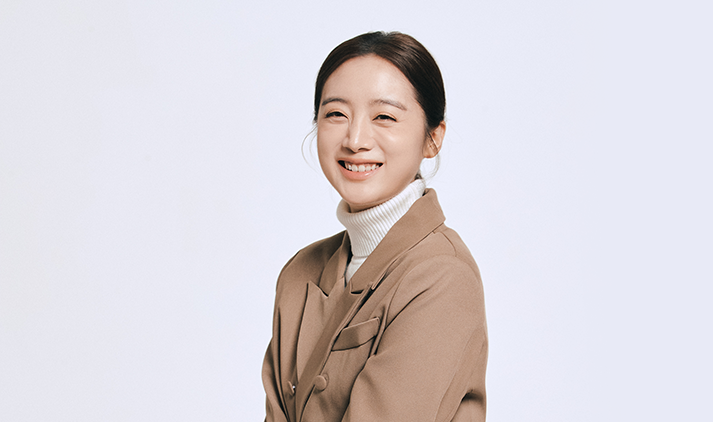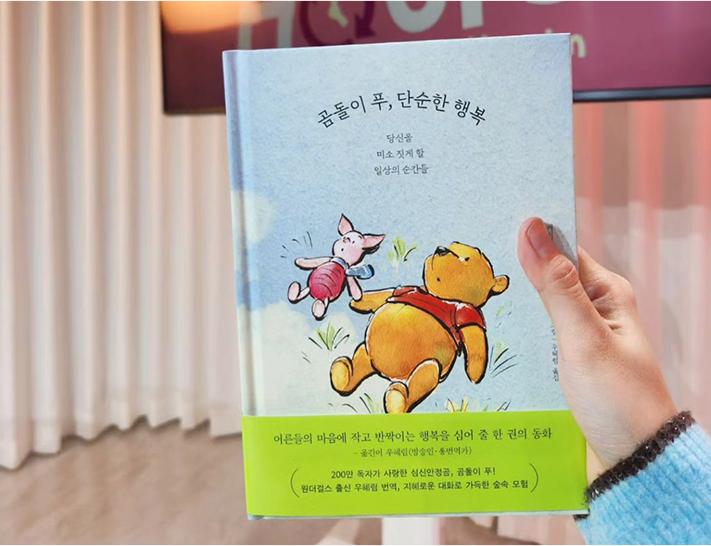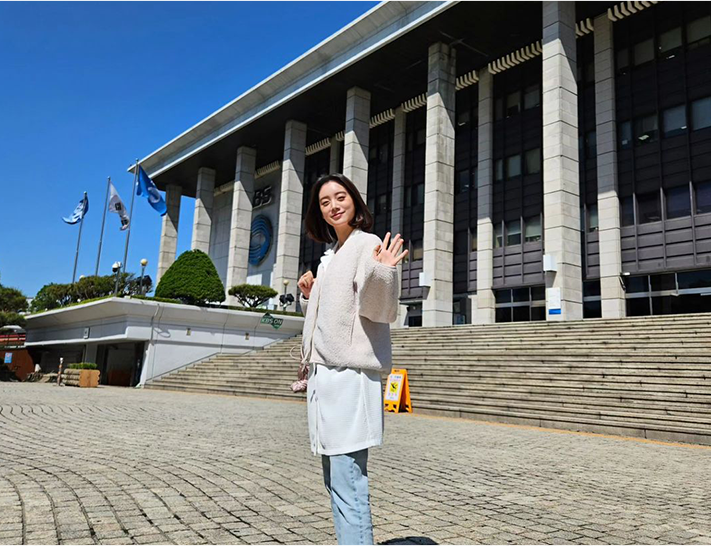

Broadcast personality Woo Hye-rim,
breaking down language barriers and
communicating with Hallyu fans worldwide
Woo Hye-rim, well-known as a former member of the K-pop group Wonder Girls, is deeply engaged in breaking down
language barriers and communicating. As a broadcaster, DJ, translator, and lecturer, Woo Hye-rim is also the new
host for the second season of K-Chat , a collaborative content by the KSIF and Arirang
TV. She is currently preparing to meet Korean learners both in Korea and abroad this October.
Hello, Hye-rim. Thank you for agreeing to this interview. Could you please introduce yourself to the readers
of "Monthly Knock Knock" and share your recent updates?
Hello! I am Woo Hye-rim, formerly a member of Wonder Girls and currently active in various fields including
broadcasting, translation, and lecturing. Recently, I have been the DJ for KBS World Radio's , where I connect with Hallyu fans globally from Monday to Friday each week, introducing Korean
popular music and trends.
Hye-rim, I understand that you are fluent in four languages: Korean, English, Chinese, and Cantonese, thanks
to your upbringing in Hong Kong. After graduating from Hankuk University of Foreign Studies with excellent
grades in the Department of International Conference Interpretation and Communication, you have shown
versatility in various fields. What about foreign languages attracts you to continuously study and engage in
related activities?
I was born in Seoul, but due to my parents' jobs, we moved to Hong Kong where I spent 14 years of my childhood.
Hong Kong being such an international city, I was naturally exposed to various cultures and languages. I
attended a local school where Cantonese was the primary language, but the classes were conducted in English. I
also loved English-language cartoons so much that at the time, I didn't think of foreign languages as 'study.'
It was just part of life. Perhaps because of these experiences, I had no aversion to foreign languages, which
enabled me to continue my studies and activities in this field.
The charm of foreign languages lies in the ability to meet and communicate with more people through
multilingualism. It's great how it breaks down communication barriers. I felt this when I debuted with Wonder
Girls and met international fans; they seemed more comfortable with me because I could speak English. They
probably liked that they could communicate with me directly, without an interpreter. That was a proud moment for
me. This charm of foreign languages continues to drive me to pursue related studies and activities.
DJ Hye-rim hosting KBS World Radio program
(From left) poster, Hye-rim preparing for the broadcast (Photo courtesy of
Hye-rim's Instagram (@wg_lim))
Then, when you decided to major in International Conference Interpretation and Communication in college, did
you have a future dream or ambition due to your advantage and skill in languages?
Actually, I didn't enroll in university with a specific career in mind for the future. I just really wanted to
go to university. While my peers were experiencing college life, I was busy working in the U.S. as a member of
Wonder Girls. So, I always had a clear goal of going to university someday.
Out of many departments, 'International Conference Interpretation and Communication' was my first choice.
Although I debuted as a singer, I often received more attention for my language skills than for my singing
ability or performances. Language-related adjectives were always attached to articles about me. Every time those
descriptors followed, I felt ambivalent about whether I should enjoy them or not. Actually, I just knew a bit
more foreign languages than others, but it often felt like my abilities were overly exaggerated in discussions,
which sometimes left me feeling hollow inside. This naturally led me to want to excel more in what I was already
good at, and I wanted to systematically learn both English and Korean to live up to the title I had been given,
so I applied to Hankuk University of Foreign Studies. It was my top choice department, and once I was accepted,
I was thrilled to study there. Having clear goals for my studies motivated me to work even harder.
You've also been appointed as the MC for the KSIF and Arirang TV's collaborative content K-chat (K-CHAT)
Season 2 . Could you share why you accepted the MC role and your feelings about it?
I really liked the purpose of the K-chat program, especially how it helps spread the Korean language more
widely. I also appreciated that I could use my language skills to help others. With the popularity of Hallyu,
like K-pop, it's appealing that through the KSIF, I can teach Korean to more people. Although I have mostly been
involved in content that involves communicating in English or teaching foreign languages, participating in
content with the purpose of teaching Korean to foreigners feels particularly meaningful, and I am excited to do
a good job hosting K-chat.
As the theme of K-chat Season 2 is 'travel,' are there any Korean travel destinations
you would recommend to KSI learners? Please also explain why.
I would recommend Gyeongju, where you can see many traditional Korean houses (hanok). I find the traditional
Korean architectural style very attractive. While you can see hanok in places like Insadong in Seoul, they feel
somewhat urban. Gyeongju, where tradition and nature blend, seems like a place where you can fully experience
the charm of hanok and the essence of Korea. Personally, I would also recommend Gangneung and Chuncheon, which
are my favorite travel destinations. Gangneung has beautiful beaches and delicious food, making it a truly
charming destination. Chuncheon is famous for its tasty dakgalbi (spicy grilled chicken) and is close enough to
Seoul for a quick getaway.
 Hye-rim's recommended travel spot, the Gyeongju Donggung Palace and Wolji Pond
Hye-rim's recommended travel spot, the Gyeongju Donggung Palace and Wolji Pond
Recently, you translated the book "Winnie the Pooh, Simple Happiness." Many KSI learners, like you, study
Korean not just as a hobby but with aspirations to become translators and interpreters. What are some
important elements, besides linguistic skills, that should be possessed for translation and interpretation?
Could you offer some advice and encouragement to KSI learners who aspire to be translators or interpreters?
Firstly, I believe the fields of interpretation and translation are somewhat different, so those studying these
disciplines might find it beneficial to specialize in the area that best suits them. When I first entered
university, I thought interpretation and translation were one and the same. However, as I studied, I realized
that depending on one's personality, one might be more suited to one area than the other. Interpretation
requires improvisation, so quick thinking is essential. On the other hand, translation is text-based, allowing
time to ponder over words and the opportunity to revise any errors. Being somewhat slower myself, I felt more
suited to translation than interpretation.
Therefore, those who are more contemplative and enjoy taking their time might find translation more suitable,
while those who are decisive and prefer quick task completion might find interpretation more fitting.
Moreover, a crucial skill needed in both interpretation and translation is the ability to convey nuances
effectively. That is, having a sense to preserve the flavor of the language while delivering the meaning
accurately. Sometimes, even if a sentence is correctly translated grammatically into another language, it might
not make sense. Considering the cultural context of the language is also necessary to convey meanings properly.
Especially when translating books, there's often a need not to translate sentences verbatim but rather adapt
them to fit the overall tone of the book and its readers, and having the sense to recognize this need is
beneficial.
Thus, especially when studying Korean for translation and interpretation, I advise not just to focus on
linguistic skills like speaking or writing but also to learn about Korean culture and history. In today's era,
related content is readily available online. If you're interested in Korean translation and interpretation, it
would be beneficial first to foster curiosity about Korea and make an effort to understand Korean culture and
sentiments.
 Book translated by Hye-rim, "Winnie the Pooh, Simple Happiness" (Photo courtesy of Hye-rim's Instagram
(@wg_lim))
Book translated by Hye-rim, "Winnie the Pooh, Simple Happiness" (Photo courtesy of Hye-rim's Instagram
(@wg_lim))
With 256 KSIs in 88 countries worldwide, including Hong Kong where you spent your childhood, if you had the
opportunity to teach Korean or Korean culture at a KSI, what kind of content would you like to teach?
Given that many learners at KSIs are interested in K-pop, which influenced their decision to study Korean, I
think it would be fun to teach a class exploring the meanings of words used within K-pop culture. For instance,
understanding the precise meanings of terms like 'ending fairy' and 'expression management' or other words used
only among fans could be enlightening. The class doesn't have to be overly formal; I'd like to conduct it in a
fun and engaging manner to spark interest in Korean language and culture. Additionally, conducting a class based
on K-pop lyrics could also be interesting. K-pop lyrics often contain beautiful and poetic expressions, and
dissecting these lyrics to understand their expressions and meanings could be both fascinating and enjoyable.
 Hye-rim heading to work for the KBS World Radio broadcast of (Photo courtesy
of Hye-rim's Instagram (@wg_lim))
Hye-rim heading to work for the KBS World Radio broadcast of (Photo courtesy
of Hye-rim's Instagram (@wg_lim))
Hye-rim, you are currently active in various fields and have achieved a lot, but it seems like you might still
have new challenges or dreams you want to pursue in the near or distant future. Could you share your future
goals and plans?
In the past, it seemed like there was always something new I wanted to challenge. However, having always lived a
life of dreaming, challenging, and achieving from a young age, I now feel a stronger desire to live a life that
is true to the present rather than having specific dreams for the future. So, first and foremost, I want to
adapt well to the radio program I host every week. I have been hosting the KBS World Radio program since January, and I am still learning a lot. I find radio hosting very enjoyable and
well-suited to me, so I want to focus on this activity.
Radio hosting is incredibly appealing because of the joy of communicating with listeners. After the activities
of Wonder Girls ended, I didn’t have many opportunities to interact with fans, so it’s very enjoyable to
communicate with fans and global listeners who love K-pop. Additionally, I’ve always wanted to engage in
activities that combine music, English, and communication with people, and hosting fulfills all three. I plan to continue enjoying the radio shows and exploring ways to promote them
to meet more people. Of course, I also plan to actively promote and film for K-chat Season 2 on my personal SNS.
Please show lots of interest and love! I hope that K-chat Season 2 can broaden the opportunities to connect
with those wanting to learn Korean.